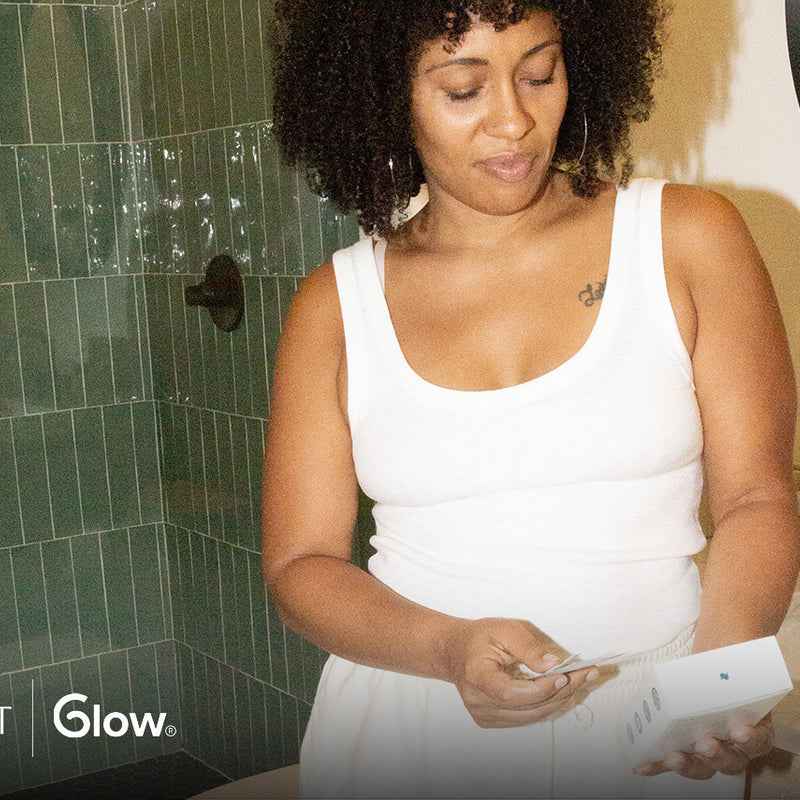How To Find Out If You're Able To Get Pregnant

Starting a family can feel overwhelming and can be an intimidating experience. If you’re new to TTC, you may be wondering if you can even get pregnant. There are plenty of tests and products to help you get started on this journey, and we’re here to help.
By OBGYN and fertility expert Dr. Kenosha Gleaton
The best way to determine if you’re able to get pregnant, is to start trying. But it’s important to get smart about when you are trying, in order to time intercourse with your fertile window (when you are most likely to get pregnant). In this article, we will review the best way to find out if you’re able to get pregnant.
Determine when, if at all, you are ovulating
The first step when trying to conceive (TTC) is finding your fertile period. This is the period leading up to ovulation when unprotected sex is most likely to cause pregnancy. A reliable and cost-effective way to find your fertile window is using ovulation tests. Start testing close to your fertile period until you get a positive result, and then focus on baby-making. For a quick estimated prediction of your fertile window, you might consider using our ovulation window calculator to enhance your chances of successful conception.
Cervical mucus tracking is another way to track fertility (and it’s free!). Your cervical mucus can show how fertile you are in the present moment. You’re most fertile when mucus is transparent, stretchy/elastic, slippery, and wet.
If you use ovulation tests for several months and never get a positive test, it’s important to bring this up with your OBGYN. They can run additional tests to determine if you are ovulating.
Know the risk factors or signs of infertility
First, I want to remind you that 90% of couples trying to conceive will get pregnant within a year of trying. I know that sounds like a long time to wait to get pregnant, but its possible that your journey is much shorter than that.
For the remaining couples who are affected by infertility (aka not pregnant within a year), know that infertility is not a permanent diagnosis. In fact, reproductive medicine has come quite a ways and many underlying reasons for infertility are fixable.
Here are some of the most common risk factors that may increase the time it takes you to get pregnant:
- Age: A healthy woman in her 20s or early 30s has a 35%-30% chance of conceiving each month, but by the time she reaches 40, the chances have gone down to 10% or less. Men over the age of 50 may be less fertile because with age, the testes tend to get smaller and softer, therefore sperm shape and movement tend to decline.
- Lifestyle factors: This can include weight outside of the healthy range for your body type (under or overweight), untreated STI’s, unhealthy habits such as smoking, drinking excessively, poor diet, etc.
- Hormonal disorders: Conditions such as PCOS can impact your ability to conceive by throwing off ovulation and vital reproductive hormones.
- Structural issues: Physical barriers can inhibit the ability to conceive as well. This could include fibroids, scar tissue from endometriosis, blockage of the cervix, abnormally shaped organs, etc.
If you have any of these risk factors, it doesn’t hurt to talk to your doctor to understand what you can do to increase your chances of getting pregnant.
It starts with the egg
“Ovarian reserve” is a term referring to the number of eggs a woman has in her ovaries. There are several hormones loosely linked to ovarian reserve, including FSH and AMH. However, multiple studies show that AMH and FSH don’t correlate with how likely you are to get pregnant. Getting pregnant depends on many different factors, and AMH and FSH do not assess egg quality or the quality of the ovaries. Multiple studies show that AMH and FSH don’t correlate with how likely you are to get pregnant.
Read more in The Truth About Ovarian Reserve Tests.
Regardless of your egg count, women will usually ovulate just one egg per month. So the chance of a natural, healthy pregnancy won’t depend on the number of eggs in reserve, but rather on the quality of the eggs and ovaries.
Unfortunately there’s no test for egg quality, other than through IVF. But there is well-supported data on the association between a woman’s age and the chances of conception and miscarriage. This is why many doctors use age as the primary estimator for how many healthy eggs you have, and for your chance of getting pregnant each month.
Sperm health matters too
Forty to 50 percent of infertility cases are attributed to male fertility issues, so knowing if you can get pregnant is also knowing if the sperm is healthy.
There are many different causes of male infertility, each falling into one of three categories:
- Sperm production disorders. These include issues with signalling or hormone imbalances that negatively impact sperm production.
- Obstructive issues. Obstructive issues, which result in reduced sperm count and often lower seminal volume, occur when sperm is prevented from being ejaculated.
- Immune system dysfunction. In some cases, the immune system may be fighting against fertility and impacting sperm
Read more in How Do I Know If My Sperm is Healthy?
A sperm analysis is a non-invasive, low-cost test in which we assess sperm. It looks at
- Count – How many sperm there are
- Motility – How well the sperm move
- Morphology – How sperm are shaped
When to consult a doctor
This depends on your age and medical history. For women under 35, the recommendation is after 12 months of trying to conceive. For women over 35, the recommendation is six months before seeking out a professional. However, you should seek care earlier if you or your partner have:
- Irregular menstrual cycles
- Have experiences two or more miscarriages
- Have a history of reproductive tract surgery, ovarian surgery, endometriosis
- Have a family history of premature menopause
- Have had exposure to chemotherapy or radiation
Tests to better understand your fertility
The TTC journey looks different for everyone, and there’s no single test that will fit everyone’s needs. Talk to your doctor about what tests are right for you and your partner, including:
- Pap smear: Your doctor may perform a pap smear and pelvic exam to identify any structural problems, as well as test for abnormal cells.
- Antral follicle count: This test is done via transvaginal ultrasound, sometimes between cycle day 2 and 5. It can help evaluate ovarian reserve, diagnose PCOS, and identify any potential problems regarding ovarian health.
- Ovulation test: Identify whether or not you’re ovulating by detecting a hormone known as luteinizing hormone (LH). These tests are affordable and can be done at home!
- Hormone tests: A blood test is usually required to measure hormone levels. Your doctor may look for progesterone, LH, estrogen, and more.
- Sonohysterogram: A sonohysterogram allows your doctor to examine the uterine lining, to ensure everything is normal.
- Sperm analysis: If you’re curious about sperm health, an at-home sperm analysis kit is a great clinical grade option.
- Hysterosalpingogram: This tests allows your doctor to determine if your fallopian tubes are open to allow for conception
In conclusion
Your TTC journey begins when you decide you are ready to have a baby. There are a lot of factors to consider including whether you're ovulating regularly, the fertility of you and your partner, and when is the right time to see a specialist? The truth is, this journey looks different for everyone.
Fortunately, 90% of couples are able to conceive within a year of trying, and for those facing infertility, there are many tests and products that may be able to help. But, first, cover the basics: purchase ovulation tests to determine your fertile window, and give it a go. We’re crossing our fingers for you!
Up next:
Sign Up For 10% Off Your First Order!
Sign up for insider access, exclusive deals, and OBGYN insights!
Reach Out, We're Here
Have questions about your order or products? For the speediest answer, check out our FAQ section. Need something else? Come find us below.
Customer Support
support@natalist.com
Press Inquiries
media@everlyhealth.com
Business & Partnerships
team@natalist.com
Affiliates + Influencers
team@natalist.com
Job Openings
Careers Page






















